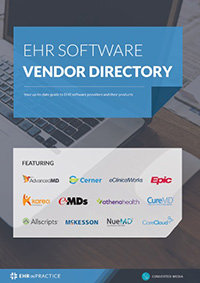Five signs an EHR vendor isn't right for you
The selection process can be fraught with traps, Some of these traps are difficult to spot, whereas others may as well be a brightly lit neon sign. An effective selection process should contain a process by which a practice should be able to use a repeatable methodology. Restated, the criteria for selecting a vendor should be clear and be able to used multiple times.
When constructing criteria for selecting an EHR vendor one of the fundamental components of selection criteria involves adding “red flags” or automatic disqualifiers. As such what particular red flags should a practice look for? The following list offers five signs that could indicate an EHR vendor is not right for you.
1. Cost ambiguity
When constructing an EHR budget and calculating an EHR’s ROI it is important to have a clear understanding of all present and future costs associated with an EHR. Regardless of whether a vendor offers a cloud-based or on-premises deployment of its product, a vendor should be able to provide a clear pricing structure. Even if there are contingencies in pricing, the vendor’s service agreement should, at a minimum offer the conditions under which additional costs will be incurred.
2. Lack of clear implementation services
Implementation planning and the actual rollout of an EHR serves as the foundation for successfully integrating an EHR into practice. Therefore, one can safely assume that an EHR vendor who cannot clearly articulate how they will assist a practice in rolling out their software will likely not be a good fit.
3. Lack of vendor-led training
As part of the implementation and ongoing support vendors provide hands-on training for all aspects of the EHR system. A red flag to look out for includes not a discussion of no cost for future training in additional to no formal training plan. EHR vendors should offer some form of training. However, the training should be clearly specified from both a content and cost perspective.
4. Lack of clarity as to conversion services
When a new EHR is implemented, original data, either in paper or electronic form must be transferred the new EHR system database. A vendor that is unable to provide a time estimate for data conversion or that cannot offer cost guarantees should be avoided. The logic employed here ties back to point #1, whereby it is important to have a clear picture of future costs when selecting an EHR and any factors which could cause delays in implementation.
5. Overselling
Even car salespeople who rightly or wrongly earned the reputation as being notoriously zealous in their sales tactics will allow a potential buyer to test out a potential purchase. EHR sales and car sales should adhere to the same rule - if a vendor spends more time talking up and demonstrating a product rather than allowing prudential users to try out the product for themselves, it may be time to explore other options.
The selection process can be daunting due to the cost of making the wrong decision, however with a consistent methodology in place that can weed out the patently bad choices, more attention can be paid to focusing on making the choices between more qualified candidates.
Free white paper

EHR Vendor Directory
Get the most up-to-date directory of EHR software vendors. Find the best software for your practice.

Featured white papers
Related articles
-

Who are the largest EHR vendors
The biggest players in the EHR market
-

5 key stakeholders in your EHR selection
Learn about the individuals that, when consulted early and often, can make your EHR selection pro...
-

5 important areas of EHR training during implementation
Successful EHR implementation is not possible without crucial EHR training




